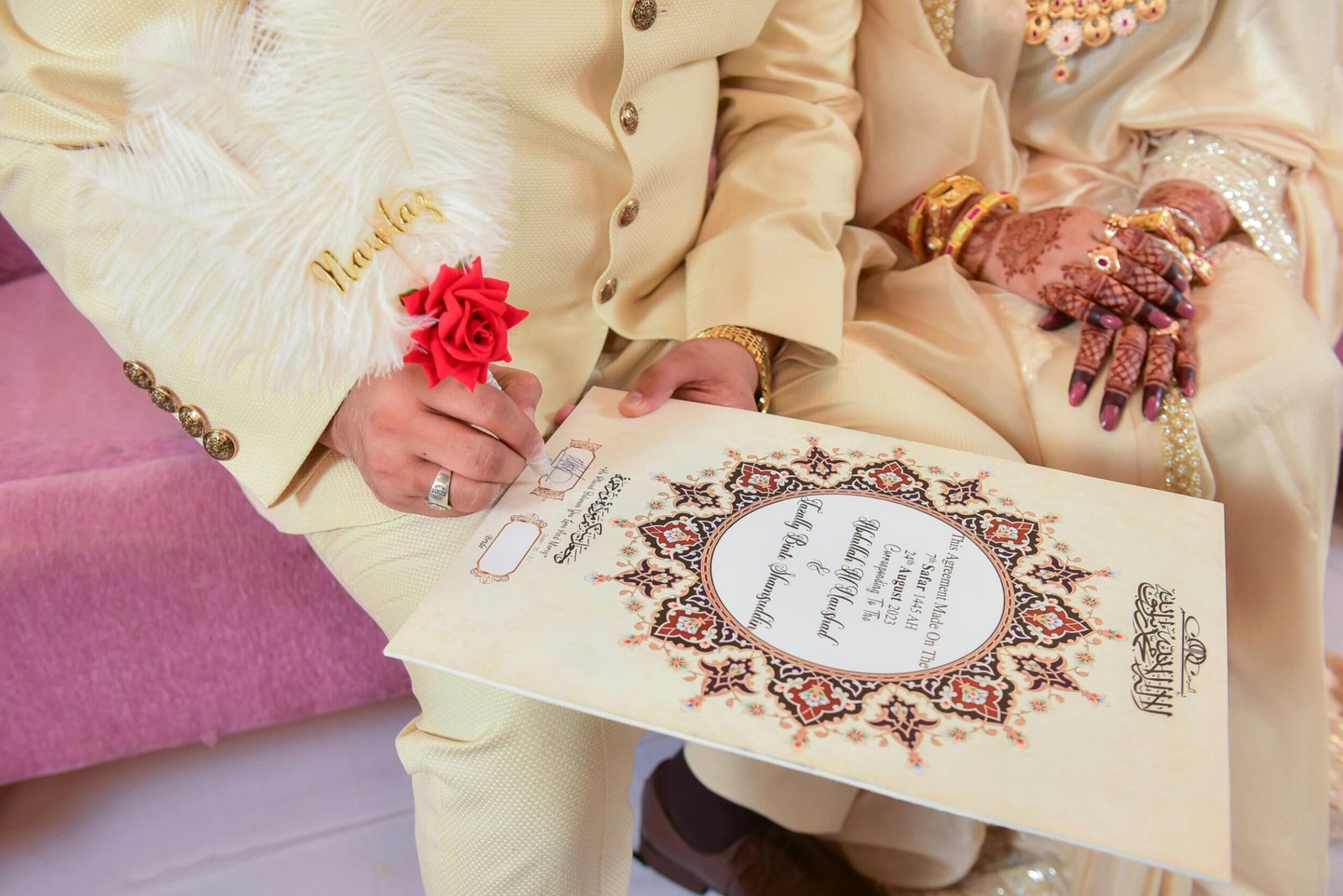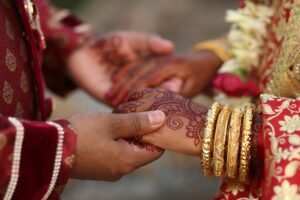Table of Contents
Nikah, the sacred contract of marriage in Islam, is one of the most significant milestones in a Muslim’s life. Beyond the joy and celebration, it’s a spiritual union that binds two souls in faith, love, and responsibility. But what exactly makes Nikah so essential in Islam? In this post, we’ll explore the importance of Nikah, its spiritual value, and the benefits it brings to both individuals and society.
What is Nikah?
Nikah is the Islamic term for marriage, but its significance extends far beyond just the union of two people. In Islam, Nikah is a sacred contract and a social institution recognised by Allah (SWT) as the only legitimate way for a man and woman to engage in intimate relations. This divine recognition gives Nikah a special status, ensuring that relationships are built within the boundaries of respect, responsibility, and faith.
Unlike the typical Western idea of marriage, Nikah isn’t simply about making a promise of lifelong commitment, romantic love, or companionship. While these are important, marriage in Islam serves a higher purpose: it’s an act of worship.
It was narrated from Aishah (RA) that the Messenger of Allah صلى الله عليه وسلم said: “Marriage is part of my sunnah, and whoever does not follow my sunnah has nothing to do with me. Get married, for I will boast of your great numbers before the nations. Whoever has the means, let him get married, and whoever does not, then he should fast, for it will diminish his desire.”
(Sunan Ibn Majah, 1846)
Anas (RA) reported God’s Messenger صلى الله عليه وسلم as saying, “When a man marries, he has fulfilled half of the religion; so let him fear God regarding the remaining half.”
(Mishkat al-Masabih, 3096)
This makes Nikah not just a social or legal bond but an essential part of a Muslim’s religious life. It provides a way to fulfil both spiritual and worldly duties, helping individuals lead a life that pleases Allah while fostering love, mercy, and tranquility between spouses.
Nikah ceremony step by step
One of the beautiful aspects of Nikah is how straightforward it is. Islam promotes ease, even in this momentous occasion. Let’s take a closer look at the key steps that make a Nikah valid:
1. The Khutbah (Marriage sermon)
The Khutbah is not compulsory but highly recommended to include in the Nikah ceremony for more blessings in the marriage. The Khutbah is usually delivered by an Imam who often begins by praising Allah (SWT), sending blessings upon the Prophet Muhammad (PBUH), and reciting verses from the Quran. One commonly recited verse is:
“O mankind, fear your Lord, who created you from one soul and created from it its mate and dispersed from both of them many men and women. And fear Allah, through whom you ask one another, and the wombs. Indeed, Allah is ever over you, an Observer.” (Quran chapter 4: verse 1)
This sermon serves to remind the couple and the community of the sacredness of the marriage contract, the responsibilities that come with it, and the importance of maintaining love, mercy, and respect within the relationship.
2. Mutual Consent (Ijab and Qubul)
At the heart of every Nikah is the exchange of Ijab (offer) and Qubul (acceptance). The concept of mutual consent is so vital that without it, the Nikah is not considered valid in Islam. Both partners must willingly agree to the marriage, emphasising that this is a partnership based on free will and mutual respect.
For this exchange to be valid, it must be expressed in either the past or present tense. For instance, the groom may say, “I am marrying you,” and the bride responds, “I have accepted.” Using future tense like “I will marry you” signals an intention but doesn’t bind the contract under Islamic law.
3. Witnesses: The Public Acknowledgment
For the Nikah to be legitimate, at least two male adult Muslims, or one male and two females, must witness the ceremony. Witnesses play an essential role in making sure the marriage is public and clear in accordance with Islamic teachings.
In Islam, marriages are not meant to be hidden or conducted in secrecy. This is why the practice of having witnesses is so important. It not only solidifies the legitimacy of the marriage but also prevents issues related to secret marriages, which are generally shunned in Islam.
A secret marriage can create complications, especially when it comes to rights and responsibilities, inheritance, and familial relationships. By publicly announcing the Nikah, the couple affirms their commitment and ensures their union is recognised within the community.
It was narrated by Aisha (RA) that the Prophet (PBUH) said: “Announce the marriage and perform it in the mosque, and beat the daff (a type of drum) to make it known.” (Sunan al-Tirmidhī 1089)
In a couple of ahadith like the one above, the Prophet صلى الله عليه وسلم even permitted the use of the daff solely for this special occasion, despite the fact that music and instruments are generally prohibited in Islam. This highlights the importance of making the marriage public so that it is clear and celebrated by family and friends.
4. Mahr (Dowry)
In Islam, the groom is required to give the bride a Mahr, which is a gift that can be in the form of money, property, or something else of value. Receiving Mahr is the right of the bride, and the amount should be mutually agreed upon, with sensitivity to the couple’s circumstances.
A Union of Love, Mercy, and Tranquility
One of the most touching descriptions of Nikah can be found in the Quran. Allah (SWT) says:
“And among His signs is that He created for you from yourselves mates that you may find tranquility in them, and He placed between you affection and mercy. Indeed, in that are signs for people who give thought.” (Quran chapter 30: verse 21)
This verse highlights that marriage is about much more than a legal contract. It’s a bond of love (mawaddah) and mercy (rahmah), where both partners find peace and comfort in each other. It’s about mutual care, support, and understanding, creating a foundation for a strong and loving relationship.
When couples marry with the intention of following the teachings of Islam, their relationship becomes a source of sakina—peace and tranquility. They are not just fulfilling their individual desires but building a life together that is rooted in faith and love for the sake of Allah.
The Rights and Responsibilities in Nikah
Men are the caretakers of women, as men have been provisioned by Allah over women and tasked with supporting them financially. So, the righteous women are obedient and guard (the property and honour of their husband) in (their) absence with the protection given by Allah. (Quran chapter 4: verse 34)
Like any strong partnership, Nikah comes with clearly defined roles for both husband and wife. These roles aren’t about who has more control but about ensuring balance, harmony, and respect within the marriage.
- Financial Responsibility: The husband is required to provide the basic necessities for his family, even if the wife earns her own income.
- Obedience and Mutual Respect: In return for being provided for, the wife is expected to obey her husband, as long as his commands do not go against Islamic teachings or the principles of Shariah. This obedience is rooted in mutual respect and cooperation, ensuring that the family operates in harmony. However, Islam emphasises that this obedience should never involve anything that contradicts the laws of Allah or compromises the wife’s dignity and rights.
- Spiritual Growth: Marriage is also a spiritual journey, where both partners encourage each other to grow in faith and good deeds.
- Emotional Support: In Nikah, emotional well-being is equally important, and both partners are there to uplift each other during life’s highs and lows.
The Benefits of Nikah for Society
Nikah doesn’t just benefit the couple; it plays a crucial role in strengthening the wider community. A solid marriage forms the foundation of a strong family, and strong families contribute to a stable society.
Marriage serves two major purposes: it is the method by which human society regulates relations between the sexes, ensuring proper conduct and boundaries in interactions. At the same time, it provides the mechanism by which a child’s relationship to the community is established. Through marriage, a child’s lineage is clearly defined, which is important not only for personal identity but also for legal and social rights within the community.
Through building these connections and meeting obligations, marriage plays a vital role in maintaining social cohesion and peace. Through Nikah, new generations are raised in environments where love, responsibility, and Islamic values are central, ensuring the continuity of the Muslim Ummah and the well-being of society as a whole.
Simplicity in Nikah: A Forgotten Sunnah?
Today, numerous couples encounter obstacles in marrying due to rising expenses and societal pressures related to weddings.
While it is perfectly acceptable to celebrate and spend within your means for a Nikah, Islam encourages moderation. Lavish weddings and extravagant spending, especially if it leads to debt or financial hardship, go against the spirit of Islamic teachings. The focus of Nikah should be on the sacredness of the union, not on meeting societal pressures or expectations.
A simple Nikah, without unnecessary expenses, is more blessed and brings greater joy in the long run because this is what the Prophet صلى الله عليه وسلم encouraged. By returning to the simplicity of the Sunnah, couples can ease the burden of wedding costs and focus on what truly matters: building a loving and peaceful home.
Conclusion: A Path to Peace and Fulfilment
Nikah is a cornerstone of Muslim life. It brings immense blessings to those who engage in it, allowing individuals to grow closer to Allah and each other. In a world full of distractions and challenges, marriage serves as a source of stability, love, and mercy. It’s a path that leads not only to personal happiness but also to the fulfilment of a significant religious duty.
Whether you’re preparing for your own Nikah or simply want to understand its importance, remember that this sacred union is one of the most cherished acts in Islam. It’s an opportunity to live a life of faith, peace, and contentment alongside your partner, and it brings countless blessings to the couple, their family, and the community.



